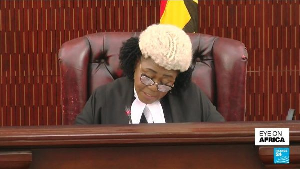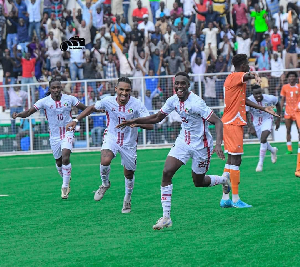By Anthony Kwaku Amoah
“The negative effects of the galamsey are several fold. It deprives the country of land for agriculture although we have not achieved food security and 28 per cent of our children are stunted”-Prof Agyeman Badu Akosa.
Necessity, they say, is the mother of invention. It is argued that had our economy been spacious enough for jobs and employment, cases of galamsey, for instance, would have been minimal or even absent.
But who says people in this venture are unaware of the dangers it poses to their lives, environment and economic stability? Due to poverty, some are compelled to employ unorthodox measures of making livelihood.
Illegal mining, nicknamed galamsey, is now one of the get-rich-quick jobs most youth are crazily indulged in. It appears more lucrative to practitioners than any other enterprise one can imagine.
Some try to advise those in it to reconsider venturing into areas like agriculture. But the question is; would they listen?
We all appreciate how destructive galamsey is in this part of our world. Prof. Agyeman Badu Akosa observes, “Vast tracts of cocoa farms have been taken over, depriving the country of short and long term benefits of cocoa to the country’s development. Many of our rivers and water bodies have been polluted with heavy metals (mercury), cyanide and arsenic, depriving people of drinking water and threatening their very existence,” adding, “It corrupts public officials, including law enforcement officers, traditional authority and distorts the local economy. It encourages truancy among school children and leads to early drop out of school. It encourages prostitution and leads to increases in rape and teenage pregnancy”.
Many areas fight for freedom over these galamsey operations but with little success. Day in day out, there are emerging conflicts between miners and indigenes of mining communities. The recent ugly clash between some Chinese miners and youth of Amansie West District in Ashanti Region is still fresh in the memory. The Daily Graphic of Friday, July 20, 2012 even did a front page story on the incident.
Because there is no discovery of gold or diamond deposit as yet in my ‘holy’ village of Ave within the new Akatsi North District of the Volta Region, inhabitants are free from galamsey disturbances.
As some localities cry foul over unlawful mining activities, others do not even know how the whole process looks like. Adventurous youth migrate from their communities to mining areas to engage in the life-threatening venture of galamsey for daily bread.
Mining job, I am told, is rewarding, though, risky. A visit to my birthplace has some nice edifices belonging to some individuals of the galamsey business. A cousin of mine with aggregate six in his BECE a couple of years ago chose to sacrifice his education for mining. Though faced with occasional industrial mishaps, life seems good for him and his family.
Suggesting to such a person to quit his job and invest in a different one say, farming may appear wicked and senseless to him. It is interesting to know that some of the people into mining now might have once been farmers, who switched along the line as a result of some industrial frustrations.
For rural communities to continue to exist and maintain their status as breadwinners of the nation, stringent multifaceted strategies must be adopted in tackling this whole matter of illicit mining.
Land owners, chiefs, district assemblies, Minerals Commission, Environmental Protection Agency, Water Resources Commission, Ministry of Food and Agriculture and others must work out and agree to effective guidelines for small scale mining.
Intensive public education on land procurement for small scale mining, extraction, processing and marketing of minerals and reclamation of mined lands must be done on a regular basis.
Mining laws and bye-laws must be explained to these small scale practitioners at seminars, workshops and public lectures in languages they understand well so that those who will still violate them can be genuinely made to face the music.
I have learnt that about 70 per cent of Ghana’s land mass has gold deposits but with a loss of over $3 billion dollars in galamsey, WHY?
Until authorities sit up for us to back them, using stones, machetes and guns on local and foreign illegal miners will bring nothing meaningful to the mining sector. Negative administrative and managerial practices, such as nepotism, bribery and corruption must be discouraged.
The time to revive our handy but dwindling resources, including the Pra, Tano, Ankobra, Birim, Densu, Offin, Odaw, Kronwea and Subin rivers is, therefore, NOW!
E-mail: amoatec27@yahoo.com
Opinions of Wednesday, 5 September 2012
Columnist: Amoah, Anthony Kwaku


















